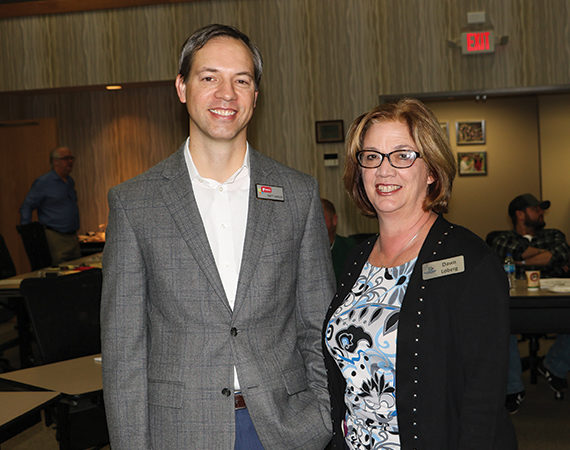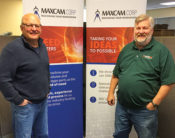The Little Falls-based Initiative Foundation and Enterprise Minnesota recently concluded a first round of reduced-rate consulting sessions designed to enable small manufacturers to become more competitive. In the arrangement, IF grants cut the cost of Enterprise Minnesota’s services by up to 50 percent, which in some cases was lowered even more by the Growth Acceleration Program (GAP) grants funded by the State of Minnesota.
Participants attended sold-out day-long sessions devoted to three subjects:
Learning to Lead helped leaders influence the culture and performance of their companies. They learned to improve team dynamics by understanding behaviors, developing the skills of a change leader, and creating a culture of accountability and engagement. Participants also learned how to: demonstrate the qualities and traits of a leader; evaluate the impact of individual behaviors on team dynamics; exhibit versatility in working with others; display the behaviors of change leaders; develop a culture of accountability; and promote employee engagement.
Principles of Lean Manufacturing (with simulation) provided manufacturers a common language to use for continuous improvement and planning, demonstrating how to generate the energy and enthusiasm needed to implement improvements. Participants were introduced to: standardized work; workplace organization; push versus pull scheduling; elements of 5S; visual controls; cellular manufacturing; plant layout; quick changeover; total productive maintenance (TPM); batch reduction; and continuous improvement.
5S (with simulation) instructed manufacturers to create and sustain workplace efficiencies through practiced “5S” process improvements: sort, set in order, shine, standardize, and sustain. Enterprise Minnesota adds a 6th “S” to include safety. Participants learned to: reduce time loss looking for an item by reducing the number of items; reduce the chance of distraction by unnecessary items; simplify inspection; increase the amount of items available; properly use space; and increase safety by eliminating obstacles.
Instruction was available to any manufacturer within the Initiative Foundation’s coverage area, which includes Benton, Cass, Chisago, Crow Wing, Isanti, Kanabec, Mille Lacs, Morrison, Pine, Sherburne, Stearns, Todd, Wadena, and Wright counties.
Formed in 1986 by a partnership of regional leaders and The McKnight Foundation, IF is one of six Minnesota Initiative Foundations (MIFs) serving Greater Minnesota. Each foundation was created to independently strengthen its regional economy and communities. It is widely believed that the MIF model is unique to Minnesota. No other U.S. state has a similar foundation network uniting community and economic development.
IF has long collaborated with Enterprise Minnesota. In addition to partnering on the annual State of Manufacturing® survey, IF has provided one-off grants to help individual companies in their region acquire specific skills, typically for companies with between 200 to 250 employees.
“But we knew we were missing a whole other tier of manufacturers who really couldn’t afford to go deep on one particular project at that level,” said Jeff Wig, IF’s vice president for economic and business development. That’s why, Wig said, he was immediately intrigued when approached with the collaboration by Dawn Loberg, a business development consultant at Enterprise Minnesota.
“These days, with low unemployment, we do a lot of work to address the shortage of workers to fill critical positions so we achieve our potential growth. If you can’t find the key people, you can’t grow the way you’d like to.
IF primarily funded its commitment, Wig said, through a USDA lending program that allows the foundation to devote a portion of interest income on technical assistance programs for local businesses. IF also used proceeds from a grant from Compeer Financial (formerly AgStar).
On top of that, qualified companies could leverage funding from GAP, a direct state investment aimed at helping manufacturing companies of 250 or fewer full-time employees access business improvement services. Since its inception in 2008, GAP has fueled over 245 Minnesota manufacturing companies to invest in their respective organizations.
IF President Matt Varilek said the program fits well with other ways his organization tries to help local employers cope with the challenges of the worker shortage. Varilek cited the state demographer’s prediction that by 2024 there will be 3.1 million open jobs in Minnesota and only 2.7 million people available to fill them. “These days, with low unemployment, we do a lot of work to address the shortage of workers to fill critical positions so we achieve our potential growth. If you can’t find the key people, you can’t grow the way you’d like to. And this technical assistance that we have long helped to provide via Enterprise Minnesota has been a great example. This group skills development rounds out the portfolio.”
Varilek said manufacturers are “having to get creative about how they find people to bring into their companies. And then once they find a person who either has the background they need or at least the potential and the work ethic they are looking for, they then get creative about how to deliver the skills needed to succeed in the position.”
…
Featured story in the Winter 2018 issue of Enterprise Minnesota magazine.
Return to Winter 2018 magazine


